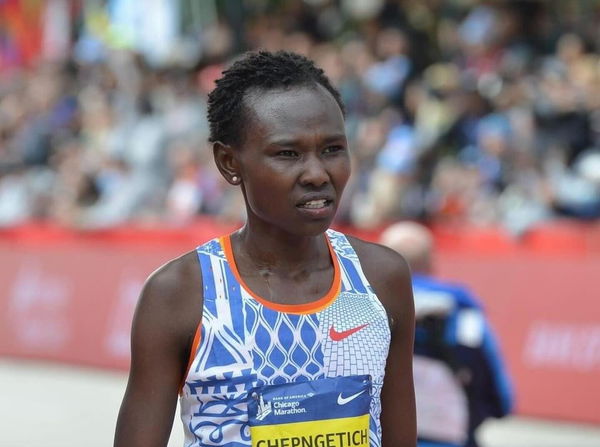

Ruth Chepngetich put out an incredible display of speed and agility at the Chicago Marathon. Her performance went straight to the record books as a female athlete’s fastest marathon time ever. The Kenyan athlete won in two hours, nine minutes, and 56 seconds. This was incredible as it shed almost two minutes from the record and was also the first one to be under the 2-hour, 10-minute mark.
Ruth’s performance was so incredible that the Kenyan Parliament noticed it. The country’s administration also saw something else, which didn’t go down quite well with them. During the after-race press conference, Letsrun.com journalist Robert Johnson asked the athlete a controversial question.
He asked that, as there have been multiple cases of doping in Kenya in recent years, some people might think that she is doping too. “What would you say to them?” he asked. Ruth answered, “You know people must talk, but…people must talk so I don’t know.” However, the Kenyan parliament didn’t take this matter lightly. They felt that the journalist was accusing the marathon runner of cheating without any substantial evidence.
ADVERTISEMENT
Article continues below this ad
According to Chris Chavez on X, Gladys Boss, a member of the parliament, demanded an apology for the question from Robert Johnson. She said, “Honorable Speaker, I urge the Cabinet Secretary for Sports, Athletics Kenya, and the Kenyan Anti-Doping Agency to stand up for our athletes and demand an immediate and unequivocal apology from Robert Johnson and others who have shamed our athletes.” While the whole parliament seemed hellbent on this topic, the fans weren’t so sure.
“Honorable Speaker, I urge the Cabinet Secretary for Sports; Athletics Kenya and the Kenyan Anti-Doping Agency to stand up for our athletes and demand an immediate an unequivocal apology from Robert Johnson and others who have shamed our athletes.”
The discussion around Ruth… https://t.co/buCnmoTRwg pic.twitter.com/HqiDxB6iPG
— Chris Chavez (@ChrisChavez) October 16, 2024
In a statement released on October 16, Athletics Kenya came out swinging in her defense. They pointed out that Ruth Chepngetich went through all the usual anti-doping tests before and after the race—just like every other top athlete—and the results came back clean. The organization wasn’t shy about calling out global media for singling her out, especially in a year when multiple records were shattered.
Athletics Kenya also took a moment to remind everyone of Chepngetich’s consistency over the years, urging the public and media to give her the respect she deserves. They made it clear: Ruth’s success comes from hard work and dedication, and it’s high time everyone acknowledges it. “Let her celebrate this hard-earned victory and let us acknowledge the years of hard work and discipline that have brought her to this moment. Unfounded doubts and unfair treatment have no place in this proud moment for Kenya and for Ruth,” they said.
What’s your perspective on:
Does questioning Ruth Chepngetich's record undermine her achievement, or is it a necessary scrutiny in sports?
Have an interesting take?
But, of course, the internet had plenty to say. After the race, one user on X threw some shade and pointed out, saying, “She has an agent. Who happens to be the same agent as the two highest-profile women’s marathoners ever busted for doping.” But others were quick to clap back. Owen M wasn’t having it, posting, “You can have your suspicions or doubts, but that doesn’t make them a fact. As the facts currently present themselves, Ruth Chepngetich ran 2:09:56 to break the world record at the Chicago Marathon, and rather than celebrating this, people are putting limits on women and are stating what they feel like is attainable or not attainable. “
So now as the Kenyan parliament threw its full support behind Ruth Chepngetich, some still defended journalist Robert Johnson of LetsRun.com for raising the doping question in the first place, citing Kenya’s track record on these allegations. As it stands, the track and field community is seriously split—some calling it an unfair attack, others saying it’s a question that had to be asked.
Track and field fans are divisive on Kenyan parliament’s demand for an apology for Ruth Chepngetich
The doping debate around Ruth Chepngetich’s marathon win has really turned into an online showdown. One fan didn’t mince words, throwing shade at Kenya’s government: “Maybe if the Kenyan government devoted more time to fighting the scourge of doping and less worrying about legitimate journalistic concerns, they wouldn’t be subject to such justifiable suspicion.” It’s not like Kenya’s history helps its case here, with nearly 100 athletes banned for doping since 2017.
After Kenya’s reputation took a major hit following the 2016 Rio Olympics—where things got so bad that the Kenyan Olympic Committee was actually dissolved—the country kicked off a massive cleanup effort. Since then, ADAK (the Anti-Doping Agency of Kenya) has been given a push in the right direction, with Kenya even investing $25 million over five years to tackle the problem. And hey, they’ve handed out their fair share of bans, like the lifetime ban to marathoner Beatrice Toroitich and a six-year ban to 10k record-holder Rhonex Kipruto.
They’ve been testing athletes rigorously, especially in the run-up to Paris 2024. Kenya’s clearly working hard to scrub its tarnished image, but some critics still feel that the old wounds run deep. One cheeky fan couldn’t resist a dig, saying, “Ha! Maybe as a start to apology season they can apologise for the ~200 failed tests for Kenyan athletes since 2004 (as per the Wada report).”

ADVERTISEMENT
Article continues below this ad
According to WADA, between 2004 and 2018, 138 Kenyan athletes tested positive for banned substances, and 113 of them got caught during competition. With that kind of record, it’s no wonder suspicions linger over every big win—even Ruth’s. But despite all the noise, Ruth Chepngetich herself has never tested positive or dodged any doping tests, as her supporters are quick to point out.
One track and field athlete chimed in: “As a track & field athlete myself, I don’t think it’s fair or morally correct to flat-out accuse athletes of doping with no evidence (positive tests, history of purposely avoiding tests, etc.).” And another fan couldn’t help but draw comparisons to athletes like Noah Lyles and LeBron James, who don’t get the same heat despite jaw-dropping performances. “Lyles ran 9:77; too fast; he must be doping. Lebron is still playing at 39, too old; he must be doping. Phelps won so many gold medals, he must have doped. Simple.”
ADVERTISEMENT
Article continues below this ad
It highlights a bit of a double standard, doesn’t it? So, where does that leave us? Should journalists like Robert Johnson be asking tough questions, given Kenya’s history, or is Ruth being unfairly targeted for suspicion without any concrete evidence? Share in the comments below!
Have something to say?
Let the world know your perspective.


Debate
Does questioning Ruth Chepngetich's record undermine her achievement, or is it a necessary scrutiny in sports?